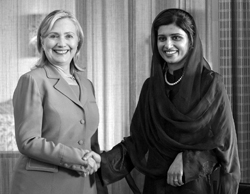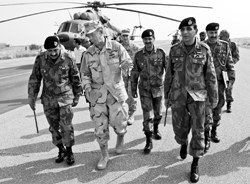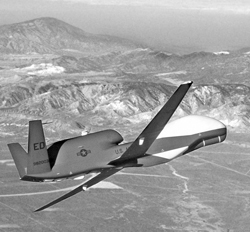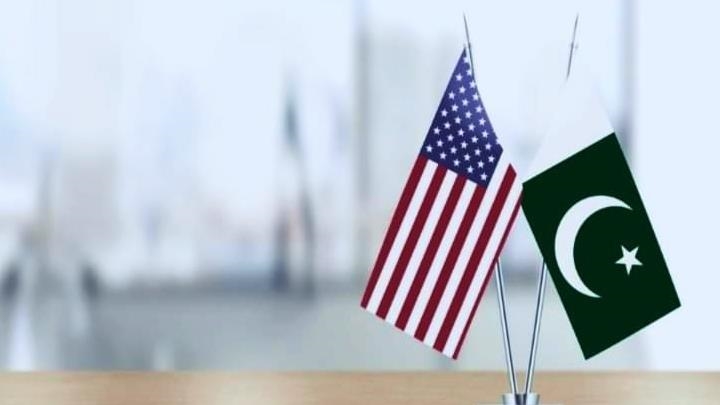Pakistan’s military should review the Taliban rule in Afghanistan and how they were not always the kind of partners and proxies we had envisioned
Our Foreign Minister, Hina Rabbani Khar, has warned the United States that if the accusations against Pakistan continue, the US might lose an ally. This statement comes in the wake of US statements that Pakistan-based Haqqani network has allegedly been involved in recent acts of terrorism in Afghanistan, directly threatening and sabotaging the NATO and US interests.
The US blames the Haqqanis for attacks on the US Embassy and NATO Headquarters in Kabul; for attacks on US troops in Wardak province earlier in September. US Chairman of the Joint Chiefs of Staff, Admiral Mike Mullen has used unprecedented and strong language against Pakistan’s premier spy agency ISI and the security establishment for nurturing proxies. Pakistan-US relations just as they were about to look better are perhaps today at a nadir in the decade old war on terror.
The US Senate Appropriations Committee has passed a bill which makes all US aid to Pakistan tied to cooperating with the US in fighting ‘the Haqqani network and other terror groups associated with al Qaeda’. On the Pakistani side, a vast majority of Pakistanis support a confrontational policy and shunning ‘America’s war’. This emotional position needs a realistic reassessment and Pakistan simply should keep its economic interests above everything.
At the same time, we should reflect as to why the Haqqani Network from North Waziristan has been operating across the Durand Line. Sixty years of policy choices have once again brought us to a critical phase today. The United States and its various policy making arms and bodies have diagnosed the key cause of their failure in Afghanistan as Pakistan’s support to the Taliban, especially the Haqqani network that it protects. This is not the first time that the US has complained and thundered about the ‘double-game’ being played by Pakistan’s security establishment. The problem with such a narrative is that it glosses over the monumental follies of US strategists and war machines.
Since the invasion of Afghanistan in 2001, the US has received substantial assistance from Pakistan. This fact cannot be denied as most of it is documented and record. Whether it is allowing for NATO supply routes to the war zone or the crackdown on Al Qaeda, Pakistan has delivered on several fronts. Therefore, narrowing the current rhetoric and reducing it to Pakistan’s culpability is neither accurate nor fair. What the US establishment has not recognised thus far is the central issue of Pakistan’s desire to have a neutral if not a friendly Western border.

The US endgame in Afghanistan that has begun now, for understandable reasons, keeps the US interests above everyone else. In a similar fashion, Pakistan’s military-intelligence complex for historical reasons does not want to be encircled by India on both the sides. Yes, it is quaint, 101-type thinking but what can be done about it. Military paradigms and institutions do not change overnight or even in a few years. Institutional change needs generations and endemic political movements to change the way state operates. The tragedy of Pakistan is that its civilians are almost always willing to be in bed with the khakis and ready to be second in command even when they are in the enviable position of effecting a change.
Take the case of recent backlash against the security establishment after May 2, 2011 strike on Osama Bin Laden’s compound. The public opinion while enraged at the US’ breach of the imaginary ‘sovereignty’ was equally embittered about the incompetence of our armed forces. Never has the Pakistan military been in such a defensive position at the domestic front. Yet, the ruling coalition did not seize the moment to sort out the long-standing issue of civil-military imbalance. The opposition party, Pakistan Muslim League (Nawaz) called for military accountability but it is far from certain if it would have collaborated with its arch-rival, Pakistan People’s Party to effect any structural changes. The last time PPP undertook a few steps to reorient the Inter Services Intelligence (ISI), it received zero support from other parties.
Ironic as it may sound, Pakistan’s grandiose foreign policy ambitions – checking the big neighbour India, strategic depth in Afghanistan, attainment of nuclear weapons – were all laid out by the hugely popular Zulfikar Ali Bhutto. Since the 1990s, the political parties have changed track and now articulate for a far more realistic foreign policy but they are sufficiently disempowered to translate that into reality due to might of the military and the way the latter has the ability to garner the support of other unelected institutions such as the judiciary and the media for its ‘line’.

Therefore, to expect the military paradigm on Afghanistan to change anytime soon is a little less than fanciful. It will not give up its space under the sun, unless of course it risks a huge reduction in its primal position within the country and its strategic leverage in the region. Thus, the choice is hard and if the US is serious about getting a fairer deal for all parties, it will need to examine this issue and bring all parties on the table, i.e. Afghanistan, Pakistan, India and Iran. Short of a regional solution sustainable peace cannot be achieved in the region.
Coming back to short-term prospects, the situation is grim. Pakistan’s security establishment has been fighting Pakistani Taliban in Swat and parts of FATA; and has been at best ambivalent about the Afghan Taliban, including the infamous Haqqani network that according to media reports has been operating from Pakistan. Pakistan’s military should also review the Taliban rule in Afghanistan and how they were not always the kind of partners and proxies we had envisioned.
Supporting extremist ideologies at home and abroad is outright dangerous. This is not the Pakistan of 1990s. Two decades later, we have a far more polarized polity with Al Qaeda’s local allies in large numbers. Al Qaeda’s nihilistic ideology, it should be remembered, is against the organisation of Pakistani state itself. How would Pakistan’s security establishment wield power in the absence of a functional state? Time and again, its capacity to manage domestic affairs has been exposed. Furthermore, national security doctrines cannot play out in a cash-strapped country struggling with stagnation and hyperinflation.
During the last decade, Pakistan received assistance worth $20.7 billion out of which $14.2 billion went to the military. The civilian share was around $6.5 billion. Under the Kerry-Lugar-Berman aid legislation, Pakistan was to receive 1.5 billion every year but the actual disbursement has been around $480 million for the past two years.
It is for Pakistan to see if it wants to choose a path of isolation and hand over the country to Al Qaeda and its affiliates, thereby putting our long-term future at stake. Or it would adopt a realistic path where it can keep its national interests above everything yet acting as a responsible member of international community.
The writer is a policy adviser based in Lahore. His writings are archived at www.razarumi.com. Follow him on Twitter: @razarumi



